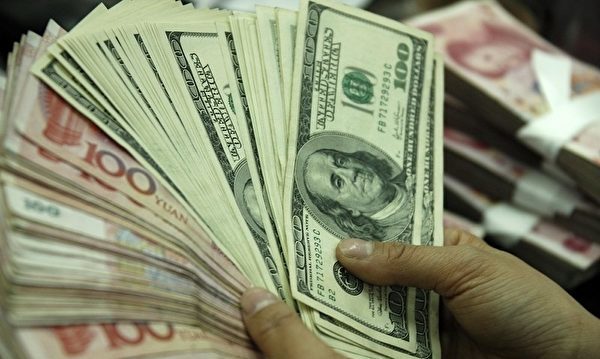[Epoch Times January 07, 2022](Epoch Times reporter Liu Yi comprehensive report) On January 6, the onshore price of the renminbi fell to a one-week low against the U.S. dollar, down 84 points from the previous trading day.
On the 6th, the onshore renminbi price closed at 6.3761 at 4:30 pm, a decrease of 84 points or 0.13% from the closing price of 6.3677 at 4:30 pm of the previous trading day; and 114 points lower than the final transaction price of 6.3647 at 11:30 pm.
The offshore renminbi price (CNH) also fell below 6.38 during intraday trading, to a low of 6.3861.
The central parity rate of the renminbi, which represents the official attitude of the Chinese Communist Party, was reported at 6.3728 on the 6th, up 51 points from 6.3779 on the previous trading day, reaching a one-week high.
The Hong Kong Economic Journal quoted the analysis of foreign exchange traders on the 6th, saying that the Fed meeting minutes released overnight suggested an earlier interest rate hike or even a reduction in the balance sheet. The U.S. Treasury yield rate rose sharply and continued to support the U.S. dollar. However, the demand for foreign exchange settlement from customers is still favorable. Renminbi: The short-term exchange rate is expected to maintain a trend of rising and falling within a narrow range, pending a change in market expectations.
Reuters quoted traders on the 6th as saying that the hawkish Fed meeting minutes clearly boosted the US dollar bullish sentiment and the renminbi continues to be under pressure, but the current market expectations have not changed significantly, and the demand for foreign exchange settlement is expected to still limit the renminbi adjustment space.
A foreign bank trader believes: “The Fed is expected to raise interest rates and shrink the balance sheet ahead of schedule, and the U.S. dollar will still be stronger, but the renminbi should be fine in the short term.”
Maybank’s latest comment believes that the renminbi is expected to consolidate in the 6.36-6.4 range in the short term, and that the renminbi may depreciate slightly this year due to the strength of the US dollar.
The exchange rate trading team of the Financial Markets Department of CCB predicts that before the Lunar New Year, there is still a large demand for foreign exchange settlement from customers, and that the RMB exchange rate will maintain a strong probability; after the year, the demand for foreign exchange settlement will fall, and the correlation between the RMB exchange rate and the U.S. index is expected to return. Under the circumstance that the influence of seasonal foreign exchange settlement and sales weakens, the difference in monetary policy between China and the United States may bring certain depreciation pressure on the renminbi.
Fed policymakers said at the meeting last month that the “very tight” job market and high inflation may require the Fed to raise interest rates earlier than expected and begin to reduce overall asset holdings.
Fed funds rate futures reflect the market’s expectations that the Fed’s March meeting will raise interest rates by 25 basis points with a probability of approximately 80%.
In addition, the Financial Times, a subsidiary of the Central Bank of the Communist Party of China, published an article on January 5 that revealed that there will be pressure for the devaluation of the RMB this year.
“Financial Times” commentator article stated that in 2022, the RMB exchange rate will face depreciation pressure brought about by the “four differences”. The risk expectation difference has reversed.
The article reminds companies, especially import companies, that companies borrowing foreign debt must establish a risk-neutral concept, effectively hedge against exchange rate risks, and beware of losses caused by exchange rate depreciation.
As of 10:26 am on January 7th, Beijing time, the onshore RMB exchange rate was reported at 6.3785 against the US dollar; the offshore price was reported at 6.3837.
The median price was reported at 6.3742, compared with 6.3728 yesterday.
.
